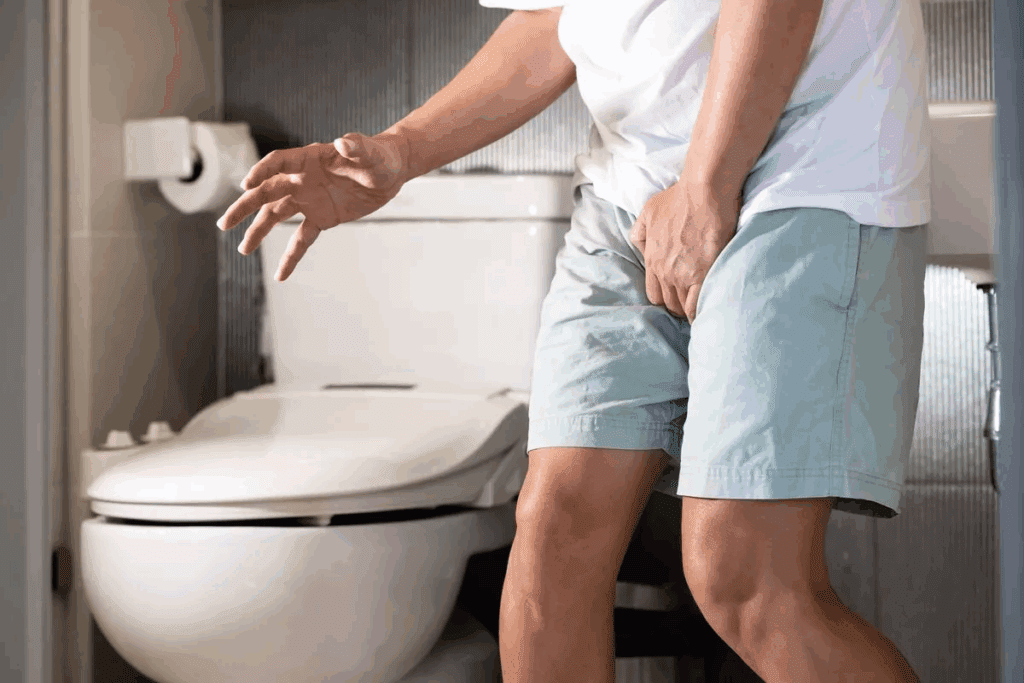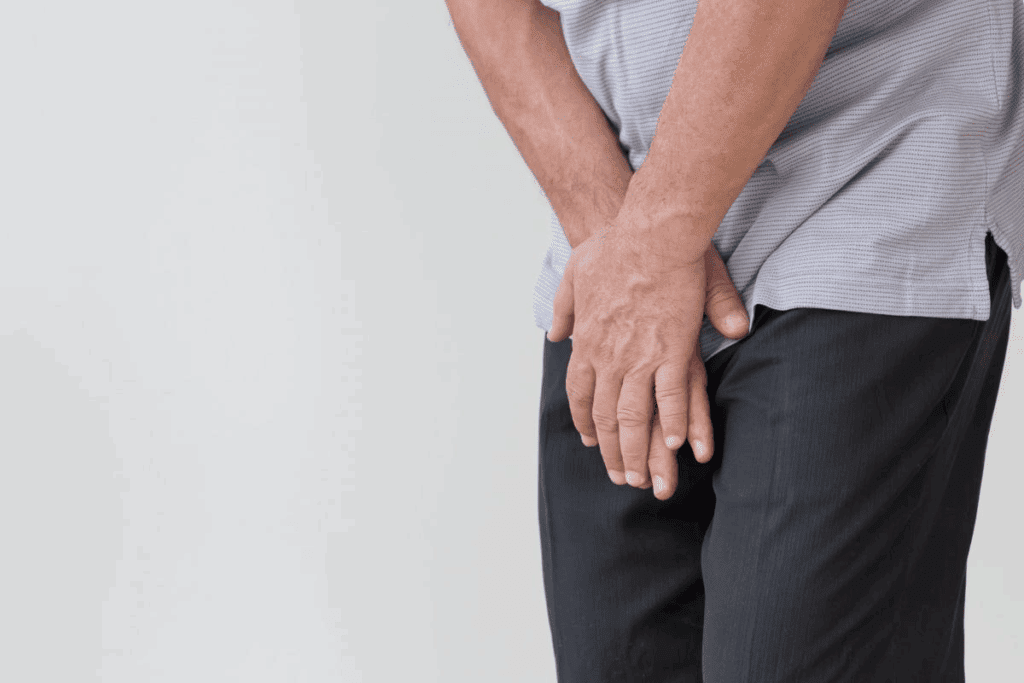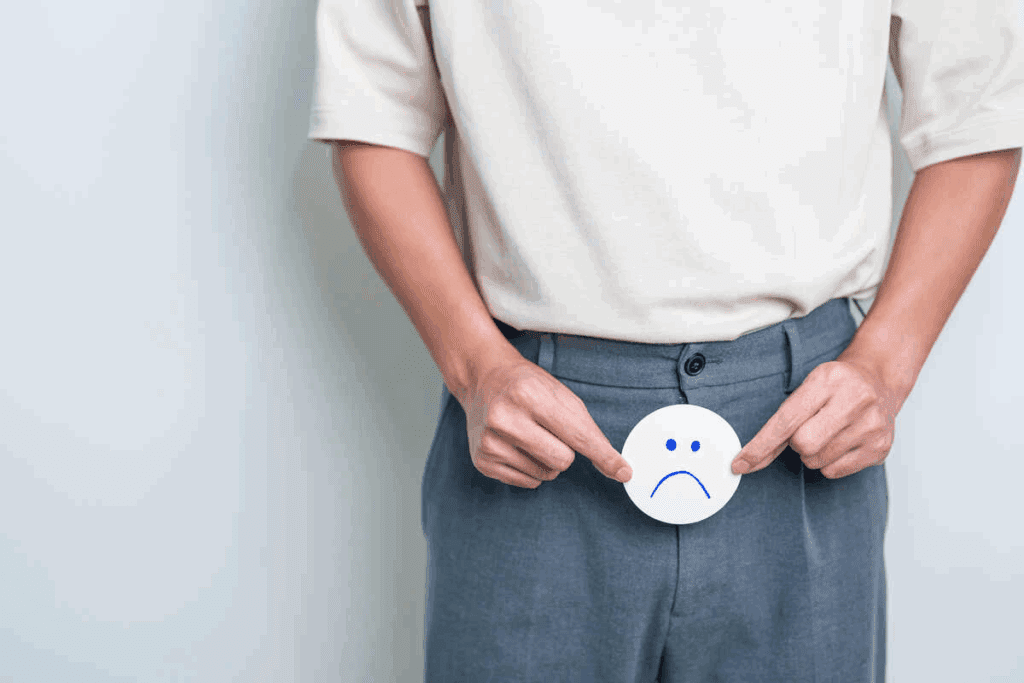
Men with urinary problems from an enlarged prostate often ask if it affects their digestion too. Benign Prostatic Hyperplasia (BPH) mainly impacts urine flow. Yet, the prostate and bowel are close, which can affect each other. Could an enlarged prostate cause constipation? Learn about the anatomical link between the prostate and the rectum and how BPH may affect bowel movements.
At Liv Hospital, we understand how these two systems can impact each other. We focus on all health factors that might be causing symptoms. This approach helps us manage health better.
The prostate and rectum are close, which means an enlarged prostate might press on the bowel. This could cause constipation. We will look into how BPH might affect bowel movements.

To understand how an enlarged prostate affects bowel movements, we must first know its normal functions and where it is. The prostate gland is a small, walnut-sized gland. It is located below the bladder and in front of the rectum. It plays a key role in the male reproductive system.
The prostate gland is in the pelvis, below the bladder, and surrounds the urethra. The urethra is the tube that carries urine from the bladder out of the body. Its location in front of the rectum is important. An enlarged prostate can press against the rectum, affecting bowel movements.
The prostate gland’s main job is to produce seminal fluid, which is a big part of semen. This fluid gives nutrients and helps sperm move during ejaculation. A healthy prostate gland is key for normal urinary and reproductive functions.
Understanding its normal function helps us see how an enlarged prostate can affect both urinary and bowel health.

BPH, or Benign Prostatic Hyperplasia, is a non-cancerous growth of the prostate gland. It’s very common in older men and can really affect their life quality. As men get older, their prostate gland often gets bigger. This can cause urinary symptoms that bother them a lot.
BPH is when the prostate gland gets bigger, which can block the urethra and mess with urine flow. Research shows that BPH hits a lot of men over 50 hard. By the 60s, more than half of men have it, and by the 70s and 80s, up to 90% do.
“The prevalence of BPH is a significant health concern among the aging male population,” as noted by recent urological research. It’s not cancer, but its symptoms can really mess with a man’s daily life and happiness.
The symptoms of BPH can differ from man to man, but some common ones are:
These symptoms happen because the big prostate gland can push on the urethra. This makes it hard for urine to flow right. Men with these symptoms should see a doctor for the right diagnosis and treatment.
As Medical Expert, a urologist, notes, “Finding and treating BPH early can really help a man’s life. It can make symptoms better and stop problems from getting worse.”
The prostate gland is close to the rectum and colon. This closeness affects how an enlarged prostate impacts bowel movements. The prostate is below the bladder and surrounds the urethra, which carries urine out of the body.
The prostate gland is very close to the rectum, the lower part of the large intestine. Any growth in the prostate can put pressure on the rectum. The rectum is part of the bowel, and pressure on it can affect bowel movements and function. The colon, or large intestine, is also nearby, and its function can be indirectly affected by an enlarged prostate.
An enlarged prostate, or Benign Prostatic Hyperplasia (BPH), can press against the rectum and potentially cause symptoms like constipation. The pressure exerted by an enlarged prostate on the rectum can narrow the rectal passage, making it more difficult for stool to pass through. This mechanical pressure is a direct result of the anatomical relationship between the prostate and the rectum.
When the prostate becomes enlarged, it can affect not just the urethra but also the surrounding organs like the rectum and bladder. The bladder can become distended due to urinary retention caused by BPH, which in turn can affect bowel habits. The distension and pressure on the bowel can lead to symptoms like constipation or, in some cases, fecal incontinence.
Understanding this anatomical relationship is key for diagnosing and treating men with BPH who experience bowel symptoms. Healthcare providers need to consider the interplay between the prostate and bowel when evaluating symptoms and planning treatment.
We look into if an enlarged prostate can lead to constipation. This is tied to benign prostatic hyperplasia (BPH) and its effects on bowel movements.
An enlarged prostate can press on the rectum. This is a possible reason why BPH might cause constipation. The prostate is near the bladder and urethra, close to the rectum. When it grows, it can squeeze the rectum, making bowel movements hard.
This pressure might make you feel like you can’t fully empty your bowels. But how much it affects you can differ a lot from person to person.
Studies on BPH and constipation have given mixed results. Some research shows a link between BPH severity and bowel issues, like constipation. For example, a study in the Journal of Urology found that men with worse urinary symptoms were more likely to have constipation.
Let’s look at some recent research findings:
| Study | Sample Size | Key Findings |
| Journal of Urology, 2018 | 1,200 men | Men with severe LUTS were more likely to experience constipation (OR = 2.3, 95% CI: 1.4-3.7) |
| European Urology, 2020 | 800 men | Significant correlation between prostate volume and bowel symptom severity (r = 0.35, p |
Not all studies agree on the strength of this link. But, the evidence suggests a connection between an enlarged prostate and constipation. This is more likely when the prostate is very enlarged or when there are other pelvic floor problems.
As men get older, they are more likely to have BPH and changes in bowel habits. Benign Prostatic Hyperplasia (BPH) is when the prostate gland gets bigger. This can cause problems with both urination and bowel movements, affecting their quality of life.
The chance of getting BPH goes up with age. Research shows that about 50% of men have BPH by 60 and up to 90% by 85. This rise with age is linked to more urinary and bowel symptoms.
Studies show that BPH and urinary problems get worse from the 40s. Knowing this helps doctors prepare and treat symptoms better.
There’s a strong link between urinary and bowel symptoms in men with BPH. Research found that men with worse urinary problems are more likely to have bowel issues like constipation. This shows how the urinary and bowel systems are connected.
The exact reason for this link is not clear. But it’s thought that the prostate’s close location to the rectum and shared nerves might be involved. Knowing this helps doctors treat both urinary and bowel problems together.
Urinary retention, often linked to Benign Prostatic Hyperplasia (BPH), can really mess with bowel function. When the bladder can’t empty right, it causes problems that affect digestion.
Urinary retention can make the bladder swell up and get bigger. This swelling puts pressure on nearby organs, like the colon. The colon and bladder are close, so any big change in the bladder can mess with the colon’s work.
The swelling in the bladder can affect the colon in several ways. It can:
Long-term urinary retention can cause many problems that affect bowel function. These include:
It’s important to understand how urinary retention and bowel function are connected. By treating urinary retention, doctors can help reduce some of the bowel problems it causes.
Medications are key in treating Benign Prostatic Hyperplasia (BPH). But, they can also affect digestion a lot. It’s important to know how they impact the digestive system for full care.
There are several types of medications for BPH, like alpha-blockers, 5-alpha-reductase inhibitors, and anticholinergics. Each works differently and can have different side effects.
Anticholinergic medications can really affect bowel function. They reduce acetylcholine, a neurotransmitter that helps the gut move. This can cause constipation.
The effects on bowel function can be big. They might cause:
| Effect | Description |
| Reduced bowel motility | Slows down food movement in the gut, leading to constipation. |
| Dry mouth | Less saliva, which can make swallowing and digestion harder. |
| Constipation | Hard time passing stools or not going often because of slow gut movement. |
It’s key to know these side effects to manage BPH well and keep digestion healthy.
We need to find a balance between the benefits of BPH meds and their digestion effects. This way, we can give the best care to our patients.
The link between constipation and prostate problems is complex. It’s key to spot the signs early for a correct diagnosis. Constipation can have many causes, and when it happens with prostate issues like Benign Prostatic Hyperplasia (BPH), it might signal a bigger health issue.
Constipation can come from many sources, like diet, lifestyle, or health conditions. When constipation is tied to prostate issues, it’s often because of the prostate’s close location to the rectum. It’s vital to tell apart constipation linked to prostate problems from other causes for the right treatment.
To tell the difference, look at these points:
Certain signs mean constipation might be linked to prostate issues, needing a doctor’s check-up. These include:
If you’re experiencing any of these symptoms, it’s vital to get medical help. A healthcare professional can do a detailed check to find out why you’re feeling this way and suggest the right treatment.
Knowing the signs that connect constipation to prostate issues helps people get medical help on time. This can stop bigger problems and make life better.
When constipation is linked to prostate issues, a detailed diagnostic process is key. Understanding the complex relationship between the prostate gland and the bowel is vital.
We start with a detailed medical history to find out what might be causing constipation. We ask about urinary habits, bowel movements, and any medications.
A physical exam is also important. It lets us check the prostate gland’s size and look for any issues. A digital rectal examination (DRE) might be used to evaluate the prostate’s size and feel.
To diagnose prostate-related constipation, we use several tests and procedures. These include:
These methods help us find out why constipation is happening and how it’s connected to the prostate. They guide us in creating a treatment plan.
By using a detailed medical evaluation and advanced tests, we can accurately diagnose prostate-related constipation. Then, we can suggest the right treatment.
Managing BPH-related constipation needs a full plan. It must tackle both the prostate issue and bowel problems. We’ll look at the different ways to ease the discomfort from both.
The first step is to handle the prostate enlargement. Medications like alpha-blockers or 5-alpha-reductase inhibitors can help. They make it easier to pee by reducing prostate size or relaxing muscles.
Minimally invasive therapies are also an option. Treatments like TUMT or TUNA aim to shrink the prostate. This can ease urinary and bowel symptoms.
To tackle bowel issues, lifestyle changes are key. Eating more fiber, drinking plenty of water, and exercising regularly can help. These habits keep bowel movements regular and prevent constipation.
Sometimes, bowel medications are needed. Laxatives or bowel stimulants can help manage constipation.
A treatment plan that covers both BPH and constipation works well. It might combine different treatments based on the patient’s needs.
For example, a patient might take medication for BPH and follow dietary advice for constipation. In some cases, surgical options like prostate surgery might be considered if other treatments fail.
It’s vital for patients to work with their healthcare provider. Together, they can create a treatment plan that addresses both prostate health and bowel symptoms.
Men can lessen enlarged prostate symptoms by making dietary and lifestyle changes. We suggest a mix of diet, exercise, and staying hydrated. These steps can help manage BPH well.
Eating right is key for prostate and bowel health. More fiber helps avoid constipation, common in BPH. Eat fruits, veggies, and whole grains for fiber.
Stay away from foods high in sugar, salt, and bad fats. Limit caffeine and alcohol to cut down on frequent urination.
| Dietary Component | Benefit for Prostate/Bowel Health | Food Examples |
| Fiber | Promotes regular bowel movements | Fruits, Vegetables, Whole Grains |
| Antioxidants | Reduces oxidative stress | Berries, Leafy Greens, Nuts |
| Omega-3 Fatty Acids | Reduces inflammation | Fatty Fish, Flaxseeds, Walnuts |
Exercise is vital for health and can ease BPH symptoms. Do at least 150 minutes of moderate exercise or 75 minutes of intense exercise weekly. Walking, cycling, or swimming are good choices.
Exercise helps with weight, heart health, and lowers chronic disease risk. This can make BPH management easier.
Drinking enough water is important, but so is managing when you drink it. Don’t drink too much before bed to avoid waking up to pee. This improves sleep.
Good bathroom habits are also key. Take your time to fully empty your bladder and avoid straining. These habits can help manage BPH symptoms.
By following these prevention tips, men with enlarged prostate can feel better and live better lives.
Understanding the connection between an enlarged prostate and constipation is key. This article has shown how Benign Prostatic Hyperplasia (BPH) affects bowel symptoms. We’ve looked at what makes this relationship complex.
The size of the prostate, urinary retention, and medication side effects all matter. These factors can make constipation worse in men with BPH. Knowing this helps doctors treat both urinary and bowel issues better.
A complete treatment plan is vital. It must consider how prostate health and bowel function are linked. Men with bothersome symptoms should get checked by a doctor. This can greatly improve their quality of life.
Managing BPH and constipation needs a mix of lifestyle changes, medical treatments, and regular check-ups. This approach helps men deal with prostate and bowel issues. It improves their overall health and well-being.
An enlarged prostate might make constipation worse because it’s close to the rectum. But, it’s not the only factor. Many things can influence this relationship.
The prostate gland is near the rectum. When it gets bigger, it can press on the rectum. This might change how you go to the bathroom.
Signs of an enlarged prostate that might lead to constipation include trouble urinating and feeling like you can’t empty your bladder. You might also feel constipated because of the prostate’s location near the rectum.
Yes, some BPH medicines can cause constipation. This is because they have side effects that slow down bowel movements.
Doctors check for prostate-related constipation through exams and tests. They might do a digital rectal exam, PSA tests, and look at how you go to the bathroom and urinate.
To treat BPH-related constipation, doctors focus on the prostate and bowel symptoms. They might use medicines, suggest lifestyle changes, or treatments for constipation.
Yes, making healthy choices can help. Eating right, exercising, drinking plenty of water, and good bathroom habits can help with BPH and constipation.
Studies show that men with BPH often have both urinary and bowel problems. This means if you have trouble urinating, you might also have constipation.
If you can’t empty your bladder, it can stretch and press on the colon. This might make it hard to go to the bathroom, leading to constipation.
An enlarged prostate might cause other bowel issues, not just constipation. But, how it affects you can depend on many factors.
To prevent BPH and constipation, eat well, stay active, drink enough water, and practice good bathroom habits. These steps can help manage symptoms.
Not every man with an enlarged prostate will have bowel problems. How it affects you can vary a lot.
National Center for Biotechnology Information. (2025). Can an Enlarged Prostate Cause Constipation Men with. Retrieved from https://www.ncbi.nlm.nih.gov/pmc/articles/PMC10172044/
Subscribe to our e-newsletter to stay informed about the latest innovations in the world of health and exclusive offers!
WhatsApp us